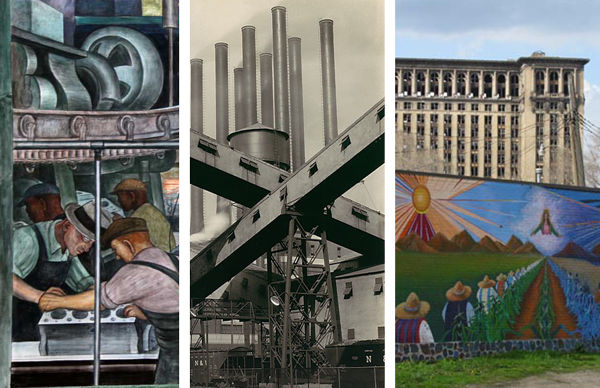Made in Detroit: A History of Art and Culture in the Motor City

The embodiment of "Modern Times" was the assembly line and Detroit, dubbed "the capital of the Twentieth Century" played an important symbolic role in the modern imagination. Yet while artists depicted Detroit's industry as an abstract emblem of twentieth century progress—and later of dystopian decline—the city has a complicated labor, racial, and political history that its art, architecture, and urban planning help us to question. This seminar examines how Detroit has been presented in modern art, and the role that the arts and architecture have played in the city from the 1880's to the present. We will consider both works produced in Detroit that defined technology and urban culture for the world and those that have particular local histories, from the sleek factories that heralded modern architecture in America to the artificial past that Henry Ford assembled at Greenfield Village, from the heroic worker figures of Diego Rivera's murals to the controversies surrounding the Joe Louis monument and the Heidelberg Project, from "ruin porn" and gentrification to prospects for the future.
Estimated cost of materials: $100 or more, but less than $150.
HISTART Concentration Distributions: D. Europe and the United States, 4. Modern and Contemporary.
Required texts (also available on reserve) will include Terry Smith, Making the Modern: Industry, Art and Design in America; Karen Lucic, Charles Sheeler and the Cult of the Machine; Thomas Sugrue, The Origins of the Urban Crisis
Optional purchase: Walter Gropius, The New Architecture and the Bauhaus; F. W. Taylor, Principles of Scientific Management. More readings will be online.
Intended Audience: upperclassmen interested in modern cities or modern art, willing to take on challenging readings. Graduates of the Semester in Detroit program, at any level, are welcome. Some background in art history, design, American studies, history, or urban studies is helpful but not required; a commitment to learning more about Detroit is essential
Requirements: Informed participation in class discussion (25%), brief response papers based on ambitious assigned readings and questions (25%); a research paper prepared in stages throughout the semester. (50%) Students are required to attend two day-long field trips which will include a bus tour of the city.
Questions? please email rzurier@umich.edu to learn more about the class.